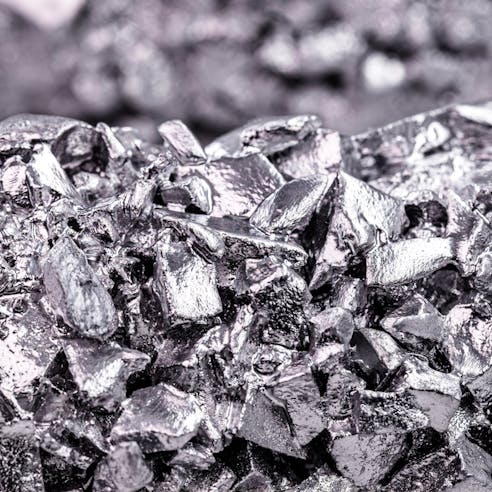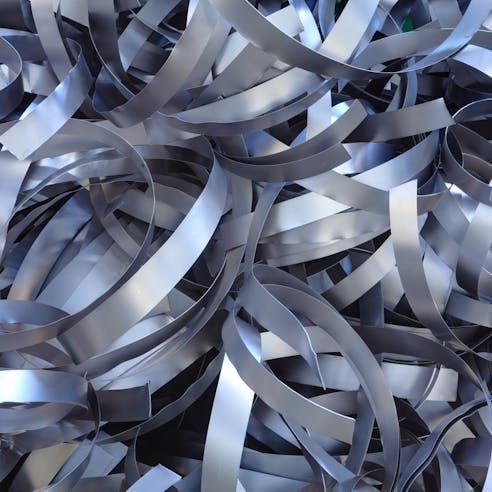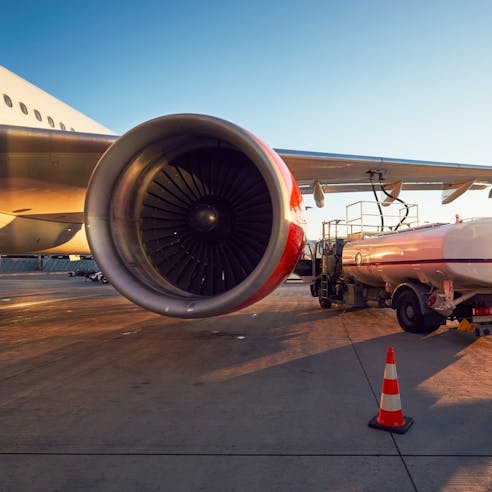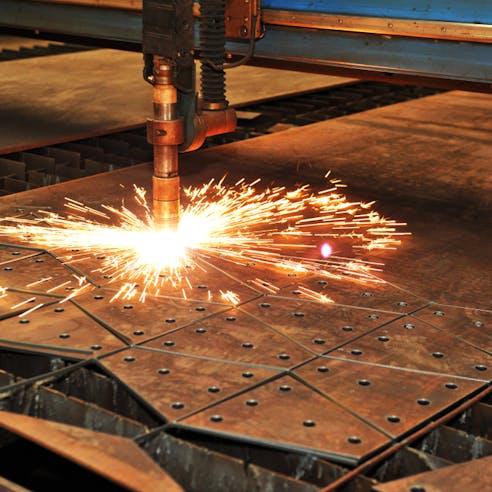Titanium Laser Cutting Services by Xometry
Xometry offers the highest quality titanium laser cutting services and can assist in the production of parts with intricate and complex geometries and excellent surface finishes.
Titanium is a metal popularly used in numerous applications for its optimal strength, temperature resistance, and weldability properties. Titanium can be laser cut using CO2 and fiber lasers. Laser-cut titanium is commonly used in the aerospace industry for its lightweight yet durable parts, specifically for aircraft structures, engine components, and interior elements. In the medical industry, laser-cut titanium is suitable for the production of implants and surgical instruments.
Xometry is a leading provider of titanium laser cutting services, offering customers access to the highest quality solutions for precision cutting of titanium materials. Our state-of-the-art laser cutting technology allows for the precise and efficient fabrication of titanium parts, ensuring that the final products meet tight tolerances and exact specifications.
What Is Titanium Laser Cutting?
Titanium laser cutting is a specialized technique that uses a high-energy laser beam to precisely cut through titanium or titanium alloy materials. It is a non-contact process that offers numerous advantages over traditional cutting methods, such as: clean-cut edges, smooth lines, complex cuts, process efficiency, and tight tolerances.
Laser cutting titanium is a very delicate process and requires the right machine settings for optimal results. Titanium must be cut at low temperatures to get the best results since it is a very reflective and heat-sensitive material. The most effective method for cutting titanium metal sheets is by using a CO2 laser with either nitrogen or oxygen as the assist gas. Fiber lasers with nitrogen assist gas are also a good option for cutting titanium sheets. However, titanium can be susceptible to burning from the heat generated by the laser. In some cases, adjustments to the nozzle and specialized gas mixtures may be necessary to prevent the metal from burning.
Fabricators often employ CNC (computer numerical control) machines for titanium laser cutting due to their automated cutting capabilities based on programming. These machines offer the fastest and most precise way to cut thick metal without compromising quality. While manual tools can be used to cut titanium at a lower cost, CNC machines are more efficient for high-volume production runs.
Advantages of Titanium Laser Cutting
Titanium laser cutting offers several advantages, including:
- Strong and Durable
- Weldable
- Lightweight
- Corrosion Resistance
- Precision
- Versatility
- Speed and Efficiency
- Material Conservation
- Complex Designs and Intricate Shapes

Strong and Durable
Titanium is known for its exceptional strength-to-weight ratio. It is stronger than many other metals, including steel, while being significantly lighter. Laser cutting allows precise shaping and cutting of titanium parts without compromising their strength or durability.
Weldable
Titanium is highly weldable, and laser cutting can be seamlessly integrated with welding processes. This enables the fabrication of complex structures and assemblies using titanium, as the laser-cut pieces can be easily joined together through welding techniques, ensuring strong and reliable connections.
Lightweight
Titanium is renowned for its lightweight nature. It weighs approximately half as much as steel, making it ideal for applications in which weight reduction is critical, such as in the aerospace and automotive industries. Laser cutting allows the production of intricate titanium components while maintaining their lightweight characteristics.
Corrosion Resistance
Titanium exhibits excellent corrosion resistance, even in harsh environments. It forms a protective oxide layer on its surface when exposed to oxygen, which provides a high level of resistance against corrosion. Laser cutting preserves this inherent corrosion resistance, ensuring that the cut edges maintain the material's protective properties.
Precision
Laser cutting provides exceptional precision and accuracy, allowing for intricate designs and complex shapes to be cut with tight tolerances. The focused laser beam ensures clean and precise cuts, resulting in high-quality finished parts.
Versatility
Titanium laser cutting can be applied to various thicknesses and types of titanium materials, making it suitable for a wide range of applications. It can effectively cut thin titanium foils as well as thick titanium sheets (up to 20 mm thick), offering versatility in meeting different project requirements.
Speed and Efficiency
After identifying the appropriate cutting settings, the laser cutting can be automated through CNC. Speedy, precise outcomes of superior quality can be achieved, leading to time and cost savings in the long term. However, although the cutting process is automated, it is closely supervised by our skilled experts to ensure exceptional craftsmanship.
Material Conservation
Laser cutting minimizes material waste as the narrow laser beam allows for precise cuts, optimizing material usage. This can lead to cost savings, especially when working with expensive materials like titanium.
Complex Designs and Intricate Shapes
The flexibility and accuracy of laser cutting enable the production of complex designs and intricate shapes that would be challenging or impossible to achieve with traditional cutting methods. This is particularly beneficial for industries such as aerospace and automotive in which intricate designs are often required.
Disadvantages of Titanium Laser Cutting
Along with the advantages, there are also some important disadvantages to consider:
- Sensitive to Heat
- High Reactivity
- High Equipment and Operating Costs

Sensitive to Heat
Titanium is sensitive to heat, and laser cutting can generate high temperatures during the process. This can result in a heat-affected zone (HAZ) around the cut edges, where the material's properties may be altered. While the HAZ is minimal compared to other cutting methods, it can still impact the structural integrity of the cut parts in some cases.
High Reactivity
Titanium has a high affinity for certain elements, such as oxygen and nitrogen. The reactive nature of titanium can lead to undesired reactions, such as embrittlement or discoloration of the cut edges. Reputable manufacturing partners can mitigate this through proper gas selection and control during the laser cutting process.
High Equipment and Operating Costs
Laser cutting machines capable of cutting titanium can be expensive to purchase, operate, and maintain. The high-power lasers required for cutting titanium and the need for specialized gases and equipment contribute to the overall cost of the process.
Titanium Laser Cutting Applications
Laser-cut titanium finds application in a wide range of industries and end products. Some of these are discussed here:
- Aircraft Structure
- Aerospace Engine Parts
- Fuel Tanks
- Ducts
- Fasteners
- Gears
- Medical Devices
- Defense and Military Applications
- Electronics and Electronics Enclosures
- Sports Equipment
- Architecture
- Components for Chemical Systems

Aircraft Structure
Titanium is used in the construction of aircraft structures due to its strength and lightweight properties. Laser cutting is employed to fabricate various structural components like panels, frames, brackets, and ribs, ensuring precise shapes and intricate designs.
Aerospace Engine Parts
Titanium is an ideal material for aerospace engine components due to its high strength-to-weight ratio, temperature resistance, and corrosion resistance. Laser cutting is utilized to manufacture critical parts such as turbine blades, compressor disks, casings, and exhaust components.
Fuel Tanks
Titanium's corrosion resistance makes it suitable for fuel tanks in aircraft. Laser cutting allows for the fabrication of fuel tank structures with complex shapes, ensuring tight tolerances and leak-free performance.
Ducts
Titanium ducts are used in aircraft to convey air, gases, and fluids throughout various systems. Laser cutting enables the production of precise duct shapes, including bends, branches, and connections, ensuring efficient airflow and structural integrity.
Fasteners
Titanium fasteners are utilized in aerospace applications due to their high strength and lightweight nature. Laser cutting is employed to create intricate shapes, such as screws, bolts, and washers, ensuring precise dimensions and tight tolerances.
Gears
Titanium gears are commonly used in aerospace applications in which light weight and high strength are essential. Laser cutting enables the fabrication of gear teeth with precision and accuracy, ensuring smooth and efficient power transmission.
Medical Devices
Titanium's biocompatibility and resistance to corrosion make it an ideal material for medical devices, such as implants, surgical instruments, and prostheses. Laser cutting enables the production of intricate and customized shapes for these applications.
Defense and Military Applications
Titanium's strength, durability, and lightweight nature make it valuable in defense and military applications. Laser cutting is utilized to fabricate components for military vehicles, armor plating, ballistic protection, and weaponry.
Electronics and Electronics Enclosures
Titanium's excellent electrical conductivity and corrosion resistance make it suitable for electronic components and enclosures. Laser cutting allows for precise shaping and customization of titanium parts for electronic assemblies. Titanium is chosen as the casing material for devices such as smartphones, laptops, and watches due to its ability to provide protection, durability, and a luxurious touch.
Sports Equipment
Titanium is utilized in the production of sports equipment such as golf club heads, bicycle frames, tennis rackets, and diving equipment. Laser cutting ensures precise shaping and customization of titanium components to meet specific performance requirements.
Architecture
Titanium can be used for architectural elements such as decorative panels, partitions, screens, and intricate designs. Laser cutting allows for precise and intricate patterns to be cut into titanium sheets, adding aesthetic appeal to interior spaces. Titanium can also be utilized for architectural facades, cladding, and exterior panels. Laser cutting enables the creation of complex shapes and designs, providing a visually striking and durable exterior for buildings.
Components for Chemical Systems
Titanium's corrosion resistance makes it suitable for handling harsh chemicals. Laser cutting is employed to manufacture components like tanks, pipes, valves, and fittings used in chemical processing systems. The precise cutting ensures accurate dimensions and tight tolerances, crucial for maintaining the integrity of the chemical handling systems.
In need of custom titanium laser cutting services?
Alternatives to Titanium Laser Cutting
Xometry also offers some alternative cutting processes that can be used instead of titanium laser cutting. These include:
- Waterjet Cutting
- Plasma Cutting

- Waterjet Cutting: Waterjet cutting utilizes a high-pressure stream of water mixed with abrasive particles to cut through materials. It is a versatile method suitable for cutting titanium and other materials, including thick or heat-sensitive ones. Waterjet cutting provides good precision and can handle complex shapes.
- Plasma Cutting: Plasma cutting employs a high-temperature plasma arc to melt and cut through metals. It is commonly used for thick titanium sheets and offers high cutting speeds. Plasma cutting can be an efficient method for straight cuts, but it may result in a wider heat-affected zone compared to laser cutting.
Why Choose Xometry for Titanium Laser Cutting Services?

Endless Options
Choose from millions of possible combinations of materials, finishes, tolerances, markings, and certifications for your order.

Easy to Use
Get started with our easy-to-use platform and let our experts take care of managing the project from locating the right manufacturing partner to delivery logistics.

Vetted Network
We are ISO 9001:2015, ISO 13485, and AS9100D certified. Only the top shops that apply to become Suppliers make it through our qualification process.